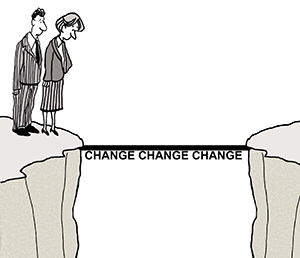After working with business owners for 25+ years, the following statements are true. Many owners:
- Say they want to retire.
- Say they’re ready to retire.
- Are unsettled about what comes next.
- Struggle with the thought of actually retiring.
Yet years pass as they struggle with the decision. Why?
First, it’s critical to add some insight surrounding two words- selling and retiring.
Selling vs. Retiring
Owners often think these two words are synonymous with one another. However, they are entirely separate. The difference? An owner sells the business, but then continues to work for the buyer for say 12-24 months, possibly longer. Sold, but not retiring.
Many owners are not ready to retire. They may just be tired of owning, being responsible for the day-to-day operations. When the right circumstances are present, they can sell their business (all or in-part) and continue to work in the business. This can be a perfect option until they’re ready to fully retire.
As you might imagine, there are various combinations to selling then working. Essentially, this allows owners to take some chips off the table and still contribute. The best part? Many have the choice of focusing on the areas of business they like, such as business development, large loss/CAT work, etc.
“Some view this as a nice half-step between ‘owning’ and full-on retiremement.”
Disaster restoration is a hectic industry. As a result, some view this as a nice half-step between ‘owning’ and full-on retirement.
Now let’s turn our focus to the 5 levels of retirement decision making. Understanding these elements is fundamental to gaining clarity on a complicated decision. Additionally, it will allow you to best manage your options while on the road to retirement.

1. Financial
Let’s start with the obvious, are you financially able to retire? May sound like a simple question, it’s surprising how many owners don’t know for sure.
The following is some examples of various investments and considerations:
- Retirement accounts
- Home equity
- Social Security
- Rental income
- Business value (and tax liability) Age and burn rate of cash Inflation
- Estate preservation measures
“It’s not at what age I want to retire, it’s at what income.”
George Foreman
Once you consider the above, ask yourself, can you retire at the level you’ll be comfortable with?
Many owners have existing relationships with professionals (i.e., wealth advisors, estate planners, etc.) who can assist with this decision. This is a fantastic place to start.
If you’re not financially able, almost without exception, the remaining variables are a distant second.
2. Ready or Tired
Second, if financially able to retire, are you ready? Why do I ask? Many owners confuse being tired, ultimately wanting to change their work-life balance, with the only solution they can think of, selling their business. These two variables are easy to combine. However, both challenges should be addressed separately.
Simply Tired
If you’re simply tired, but not ready to retire, that’s somewhat predictable. A successful outcome often involves engaging an industry consultant who assists with systems and procedures, accountability, trust and delegation with your team. They generally apply industry ‘best practices’ to you and your specific business. With some diligence, ‘tired’ can and should be solved. A satisfactory work-life balance is essential for a rewarding career.
Feeling Ready

If you are feeling ready to retire within the next few years, then answers are essential. A few solid answers relating to business value, best buyers, transition timelines, wealth preservation, tax consequences and more, will not only provide confidence, but ensure the best decisions are made for you, your family, and your future.
Where is Your Needle?
I always ask potential sellers, “How much gas do you have left in the tank?” The responses essentially fall into three categories:
- “Still 7- 10 years out, just planning for now.”
- “Enough… but in the next 2-3 years I’ll be ready to call it quits.”
- “I’m Runnin’ on fumes… you gotta get me outta here!”
“There’s no such thing as work-life balance. There are work related choices you make, and they have consequences.”
Jack Welch
This honesty always trumps when an owner says some version of, ‘I could work for years yet.’ Then fast forward, when the first offer comes along (even a bad one), the seller acts like a dog after a bone. It’s more common than anyone will admit, many owners are ready 1-3 years before reaching out for solid answers or assistance.
The danger? Some owners get ‘short-timers syndrome.’ They get one foot out the door, then take the other off the gas and their business begins to suffer. This has a drastic negative effect on value.
Where’s your needle on the fuel gauge? An honest conversation with yourself (and possibly your spouse) will determine where you stand.
3. Market Timing
I’m regularly asked, “When is the best time to sell?” Of course, it’s impossible to answer for your specific situation. However, here are a few guidelines to consider.
Like Stocks
Selling a business is a little like the stock market; when trends are upward, it’s more attractive with seemingly less risk. When trends are declining, the perception of risk increases and the price decreases.
Industry Strength
During the 2008-2010 recession the disaster restoration industry was minimally affected. Even in the 2020 pandemic, with few exceptions, the industry remains very strong.
When you consider the recent past, the industry has consistently been both strong and reliable.

Industry Consolidation
This has been a hot topic the past few years. There have been many high-profile consolidations with dozens more in the shadows. In a tumultuous market, the industry itself has been viewed as a ‘safe place’ to invest. Thus, there’s heightened appeal by not only industry buyers, but hundreds of Private Equity Groups. As of now, there are no signs of the consolidation trend slowing. However, among the recent economic uncertainty, there’s a chance we’ll find out just how recession resistant our industry is.
Selling to an industry buyer is not an ideal sale/structure for every seller. However, it may be worthy of consideration when the time is right.
Financing
Part of the market consideration should always be the strength of both buyers
(individual and corporate) and the lending environment in which they operate. Over the last decade, there’s been no shortage of experienced individuals- GM’s, lead estimators or PM’s wanting to own their own business. With low-interest rates and a favorable SBA lending environment, it’s proven to be a solid combination. When transaction prices exceed $5M on a solid business, financing is rarely an issue.
Some try to ‘time’ the market. My suggestion has always been, make the best-decision for you and your family when it comes to timing. Solid businesses have always been sellable.
4. Emotional
Years ago, I brokered the business of an 83-year-old owner who had started her company in 1951 at the age of 29. Her name, face, and personality were synonymous with her business, so it was with sensitivity we discussed retirement, hobbies, the joy of family, grandkids, and more. She agreed wholeheartedly, reaffirming her desire to sell.
Within months we found the ideal buyer and negotiated successfully. Two weeks before closing she called, one I will never forget. In tears, she was distraught with her decision to sell. She finally said with exasperation, “Without my business, who am I?”

After 50+ years as a business owner, she had no idea who she was supposed to be outside of her company. She absolutely couldn’t comprehend life beyond work. Later she even told me selling her business seemed like death.
This scenario may seem extreme, but it perfectly illustrates a point. To a degree, every owner must face this question,
“Without my business, who am I?” I argue many owners are not ready to sell until they have successfully reflected on this question.
Why so difficult?
Business ownership has its privileges, financial and otherwise. Being the boss brings a gratification that can be difficult to give up. (Many won’t admit it, but it’s true.)
“Being the boss brings a grativation that can be difficult to give up.”
As an owner, you’re needed, people depend on you and your opinion is paramount. I’m not referring to owners who go out of their way to gain attention- simply referring to the day-to-day management decisions (and social status) that often fall within the ‘ownership’ spotlight.
When contemplating a sale, for some it’s troubling when suddenly realizing they may not be viewed as ‘important’ without their company.

When the Phone Stops Ringing
As an owner, you’ll have your own unique experience. Here’s an example. A few years back, I assisted a Canadian client in selling his business. The buyer had significant experience and the transition time was short. Just three weeks after closing he and his wife took a 7-day vacation for the first time in 20+ years.
He called me upon his return, with trepidation in his voice. “My week was a bit surreal, my phone only rang twice in six days, and those calls were from my kids checking up on us! Apparently, nobody needed me. Nobody cared where I was or when I was going to return. It’s a little odd but think I can get used to it!”
How will you react when the phone ‘stops ringing’?
“It was a bit surreal… noboy cared where I was or when I was going to return.”
5. Social
Being socially and emotionally connected to a network of friends and associates matters.
As it relates to retirement, this strong social component has often been ignored. According to John Cacioppo, a professor of psychology at the University of Chicago and director of the university’s Center for Cognitive & Social Neuroscience, “We think about financial protection in retirement, but we think very little about social resilience after retirement.”
Not being or feeling connected is social isolation. Researchers have determined this isolation can be as harmful as cigarettes and drinking, actually shortening lives! You’re probably thinking, “I have friends; this one doesn’t apply to me.” Well, here is exactly why it might.
As a business owner, let’s look at your most popular social connections; it’s called your
‘social portfolio’:
Q: In a typical day, who do you communicate with?
A: Employees, vendors, suppliers, clients, sub-contractors, etc.
“We think about financial protection in retirement, but we think very little about social resilience after retirement.”
Yes, the vast majority of connections are often work-related! For many, the simple thought of not working equates to the elimination of these connections. What follows? According to science, feelings of loneliness and social isolation. (Who knew?)
It’s no mystery why some say they want to retire but can’t bring themselves to do it. Worse yet, they don’t even know why?
Two Key Questions
While working, most owners admit feeling ‘emotionally connected.’ Thus, the two (not- so-silly) questions become:
- “Who are my social connections outside of work?”
- “How important are they?”
“Science has proven it makes the decision to retire an easier one.”

Spending time now to successfully cultivate a ‘social portfolio’ away from the office will prove to be a valuable investment of time. Science has proven it makes the decision to retire an easier one.
Many owners approach retirement with ease and grace, welcoming it with open arms. Others struggle as they venture on a quest to discover who they are and their ultimate purpose outside of work.
Once you’ve answered the basic financial questions surrounding the ability to retire, I challenge you to ask yourself a few more. These answers will not only assist in your decision-making, but quite possibly be a pleasant surprise.













